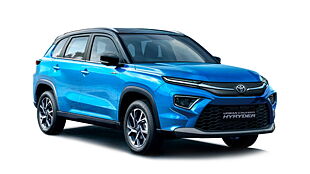Introduction

The Toyota Camry has carved out a place for itself in the saga of modern motoring. It is one of the few vehicles that are popular both among private buyers and the fleet market. It is a major seller for the Japanese automaker in a majority of the Gulf countries, USA and even China. Its popularity is further heightened by the fact that it is the preferred choice of chauffeur driven vehicle among five-star hotels and airline fleets.

In India, despite being a niche player, the car has a similar kind of popularity. Wanting to take the game a little further, Toyota launched the hybrid version in late 2013 and just to sweeten the deal made it a CKD. This turned out to be the step in the right direction as sales numbers revealed that of the 724 Camrys sold in India, 526 were Hybrids while just 198 were standard petrol models showing that Indians are now on the ‘Go Green’ road.

Now as a part of the model’s life cycle, Toyota has updated the Camry Hybrid and by the look of things, has added all the right features and large amounts of chrome to help the car continue its premium run.
Exterior
The Toyota Camry hybrid was launched for the Indian market in late 2013 and this is a mid-life update for the vehicle rather than an overall change. The most visible update is on the front fascia where the heavy chrome from the fog lamps has been moved to a revised front bumper which now sits in front of a honeycomb grille.

The bumper gets a chrome bottom lip while the indicators have now become vertically stacked units that sit below the headlights with LED DRLs. Otherwise, all the elements including the “I’m a hybrid car” blue shading in the Toyota logo, and chrome forehead marks have been carried over from the previous vehicle.

There are no major changes to the side profile of the Camry hybrid apart from the new vertically stacked indicators and the wheel design. A change in the latter from a simple spoke design to a more complicated arrow one has increased the premium feel of the car and also given it slightly more sporty credentials.

Toyota appears to have done some major work on the rear of the Camry Hybrid. The thick chrome strip that ran above the number plate holder has now been stretched out and runs across the length of the boot. It cuts into the tail lamps changing their layout as the reverse lamps have now moved above the line while the brake lights sit below it. The rear bumper remains untouched, but now the reflectors have become larger and have moved to the base of the unit. Toyota has also added another chrome strip at the base of bumper to bring about uniformity in the design.

In a country where shiny is equated to rich, the addition of a significant amount of chrome as compared to the older model is a sure fire way to up the ante when it comes to the premium appeal of the Camry Hybrid. It was a never a great looking car but stood out and continues to do so due to its size, rarity and well now, the bling factor.
Interior

The Toyota Camry and the hybrid version have always been known as the stepping stones into the world of chauffeur-driven luxury, a reputation that the model has kept for a while now. There is a tonne of features and luxury options that make the case for the tag that this vehicle holds.

Before I go into detail about changes to the cabin, I must mention that the overall layout in the cabin has not changed. In the larger scheme of things, this means, the Camry’s interior design layout has been a hit with its customers and so there are additions rather than large changes.

Stepping into the driver’s seat we can see that the instrument cluster has been revised and there is now a sportier twin clock layout as compared to the older three stack single piece design. The screen in the middle of the cluster is now larger and conveys more information. The standard Camry gets an RPM gauge while in the hybrid models this has been replaced by a power gauge. The temperature readout is a needle and display unit as compared to the older car’s digital setup. In an age where minimalist is the in thing, we can see that climate control dials have now been replaced by switches giving the setup a cleaner appearance.

Also, the display for the climate control is now a colour screen. The centre portion between the front two seats remains the same in terms of layout, but now the plastic gate assembly of the gear lever has been finished in a greyish black shade. The faux wood inserts and airy beige tone of the leather seats do the job well of making the car feel spacious and comfortable.

The infotainment system is comprehensive and has everything that you would expect in a unit found in a car at this price range. This screen also doubles up as the display for the reverse camera as well as providing car related data. What we found a bit odd was the grey plastic outer cladding of the system as it makes it look very aftermarket. We believe that if a faux wood insert had been used in place of the plastic, the appearance would not have been an issue.

Accordingly, Toyota has given the rear seat passengers a decent amount of kit to play with. There are more wood inserts and chrome door handles for both sides. The rear seats get an independent climate zone with audio and temperature controls integrated into the armrest. The left side passenger gets the option of moving the front seat all the way forward and then subsequently reclining the rear seat for some stretched out relaxation. Some added comfort over this is the presence of transparent blinds for both windows as well as the rear glass which rather than providing privacy dims out the external light. This extension package also includes a foldable headrest for the left to afford a better view of what is going on outside in front.

The NVH insulation in the cabin is fantastic and is most evident when the car is running on electric mode. You can barely hear anything from the outside apart from the petrol engine which when running seems like a far-away rumble.

When being driven around, if you were to sink into the left side seat after pushing it into full recline mode and putting some progressive music on the stereo (as I did), it is a superb experience to lie in comfort and to watch the world race past you outside the window.

On the practicality front, there are cup holders for the front and rear passengers while all four door pockets can hold two 1.0-litre bottles each, thanks to individual slots in the pockets. The boot is about 350-litres which is less than the standard car. This is due to the space being taken up by the batteries for the hybrid unit. Even then it is more than sufficient for a couple of bags as the opening is wide and long.

Engine & Gearbox

The Toyota Camry hybrid facelift remains the same as the outgoing model in terms of the engine and the underpinnings. In the hybrid version, the 2.5-litre four-cylinder engine has been detuned to produce 160bhp and 213Nm of torque. The Hybrid Synergy System (electric motor and petrol mill working together) as Toyota has dubbed it takes the total output to 205bhp and 270Nm of torque. Power is sent to the front-wheels via a CVT gearbox.

There are three driving modes being offered with this engine- ECO, EV and standard mode. Thumb the starter button in any of the three modes and voila! There is no sound! It took quite a few attempts for all of us to realise that the electric motor had come on and that the vehicle was actually running.

In the Eco mode, the power delivery is a far more sedate and up to 55kmph or depending on throttle input, the car will travel only in electric mode after which its switches on the petrol motor. In the EV mode the car runs purely on electricity and is limited to a top speed of around 45kmph.

In standard mode: unhinge the foot-controlled parking brake as always, press the throttle and you are greeted by an instant wave of torque right from the word go. However, if you mash the throttle, then there is a rubber-band effect commonly associated with the CVTs when it comes to power delivery. The ICE, when running, also charges the batteries as does the process of regenerative braking.

Ride & Handling

The Toyota Camry Hybrid’s suspension has been tuned for comfort, something it has in oodles. It absorbs all the pot holes, bumps and undulations with hardly anything making its way to the cabin. The car feels extremely planted on the highway even at 140kmph but tends to roll in the corners due to the large size and soft setup.
 There is little or at times no feedback from the overly assisted steering wheel. This means that while the highway manners are questionable it is quite easy to drive at low speeds and for the most, does not let you feel like you are driving a 4.85 metre 2.1-tonne luxury sedan. The car has been fitted with 215/60 R16 Yokahama Decibel E70 tyres which have been designed to minimise road noise while being able to provide the performance required for a vehicle of this size and capacity.
There is little or at times no feedback from the overly assisted steering wheel. This means that while the highway manners are questionable it is quite easy to drive at low speeds and for the most, does not let you feel like you are driving a 4.85 metre 2.1-tonne luxury sedan. The car has been fitted with 215/60 R16 Yokahama Decibel E70 tyres which have been designed to minimise road noise while being able to provide the performance required for a vehicle of this size and capacity.Verdict

The Camry had a lot going for it once Toyota began CKD operation of the hybrid version. It is good looking, eco-friendly and as we have seen in the review, extremely comfortable to sit in the back and be driven around. The external changes and increased feature list add quite a bit of value to the car making it an even more mouth-watering proposition.
One of the things that should help the Camry Hybrid sell is the fact that its buyers are now offered a significant discount under the FAME initiative (Faster Adoption and Manufacturing of Hybrid and Electric vehicles) which the Centre introduced in the 2015 budget.

![Toyota Camry [2015-2019] Image Toyota Camry [2015-2019] Image](https://imgd.aeplcdn.com/272x153/cw/ec/18516/Toyota-Camry-Interior-118580.jpg?wm=0&q=80)
























